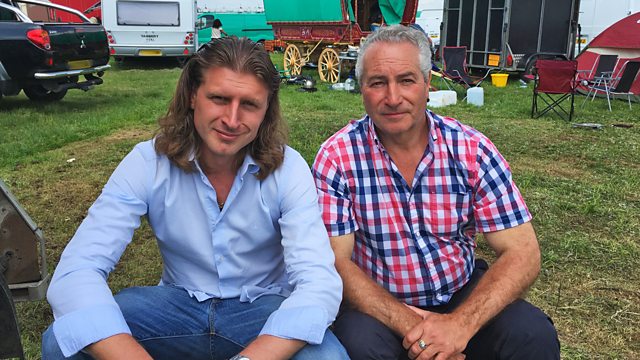
Romany Gypsies
Writer Damian Le Bas explores how Gypsy people in the 1960s were forced to abandon their nomadic way of life for a more settled existence.
"Welcome to Gypsy Land!" Writer Damian Le Bas invites us to join him as he explores a pivotal decade in the lives of Romany people. In the 1960s many were forced to abandon their nomadic way of life for a more settled existence. Focusing on the Βι¶ΉΤΌΕΔ Counties, Damian draws on his own Romany family background and rich film archive to show how Gypsy people faced becoming outlaws in their own land. Regular stopping places for their caravans were drying up and tighter planning laws put further pressure on finding somewhere to live. Local and national government were slow to react to a mounting crisis for a group of citizens with a distinct culture but living on the margins of society. Breakthrough legislation in 1968 finally compelled councils to provide permanent sites for Gypsy people. It gave hope to many, but at the cost of losing a freedom closely tied to their identity.
Last on
Clip
-
![]()
Preview: Romany Gypsies
Duration: 01:16
About the programme

Writer Damian Le Bas explores a pivotal decade in the lives of Romany people, the 1960s.
Β Large numbers were forced to abandon their nomadic way of life for a more settled existence - a painful transition for many.Β
Focusing on the Βι¶ΉΤΌΕΔ Counties, Damian draws on his own Romany family background, and a rich film archive, to show how Romany Gypsy people faced becoming outlaws in their own land.Β
New legislation led to tighter planning laws and a further erosion of traditional stopping places, but some councils did provide a handful of official caravan sites.
Damian charts the highs and lows the Romany Gypsy community faced, and the stories of the people who helped them.
They included the romantic novelist Barbara Cartland, who secured a permanent site in Hertfordshire, and Grattan Puxon, from the first National Gypsy Council, who brought in new tactics to support travellers.
Breakthrough legislation in 1968 finally compelled councils to provide permanent sites that gave hope to many.
But it was at the cost of losing a freedom, which was closely tied to their identity.Β
Damian reveals that despite this, 50 years on, Romany people still have a clear sense of their ethnicity, on full show at the Horse Fair in Appleby, Cumbria.
Credits
| Role | Contributor |
|---|---|
| Presenter | Damian Le Bas |
| Producer | Adam Keelan |
| Executive Producer | Tony Parker |
| Series Producer | Diana Hare |
Broadcasts
- Mon 10 Dec 2018 22:50Βι¶ΉΤΌΕΔ One East & Cambridgeshire only
- Mon 11 Feb 2019 21:00
- Tue 12 Feb 2019 02:35
- Wed 16 Oct 2019 23:10Βι¶ΉΤΌΕΔ One Cambridgeshire & East only
- Wed 9 Nov 2022 00:25

